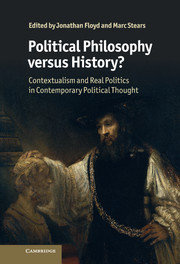 Political Philosophy versus History?
Political Philosophy versus History? from Part I - The challenge of contextualism
Published online by Cambridge University Press: 05 June 2012
. . . the only way to make discernible progress in political philosophy is by studying history, social and economic institutions and the real world of politics in a reflective way. This is not incompatible with “doing philosophy”; rather, in this area, it is the only sensible way to proceed. After all, a major danger in using highly abstractive methods in political philosophy is that one will succeed in merely generalising one’s own local prejudices and repackaging them as demands of reason. The study of history can help us to counteract this natural human bias.
Raymond Geuss’s warning against excessive abstraction in political philosophy is well taken and familiar. Similarly, the claim that attention to history is also important for progress in political theory and philosophy is also eminently sensible (as far as it goes), and unlikely to be denied by any but the most uncompromising of rationalists: the late Robert Nozick and more recently the late Gerry Cohen might perhaps come to mind. Most contemporary political philosophers acknowledge the importance of history and contingent circumstances in thinking about politics and moral life. What is at issue is how far we should push this acknowledgement of the claims of history for any viable political philosophy. This is the issue I wish to address in this chapter. For despite the superficial good sense of Geuss’s claims in the opening epigraph, he goes on in most of his work to make a much stronger assault on the possibility of a political philosophy that does not give pride of place to history, and he uses an appeal to history to support his scepticism about the claims of reason in political theory.
To save this book to your Kindle, first ensure no-reply@cambridge.org is added to your Approved Personal Document E-mail List under your Personal Document Settings on the Manage Your Content and Devices page of your Amazon account. Then enter the ‘name’ part of your Kindle email address below. Find out more about saving to your Kindle.
Note you can select to save to either the @free.kindle.com or @kindle.com variations. ‘@free.kindle.com’ emails are free but can only be saved to your device when it is connected to wi-fi. ‘@kindle.com’ emails can be delivered even when you are not connected to wi-fi, but note that service fees apply.
Find out more about the Kindle Personal Document Service.
To save content items to your account, please confirm that you agree to abide by our usage policies. If this is the first time you use this feature, you will be asked to authorise Cambridge Core to connect with your account. Find out more about saving content to Dropbox.
To save content items to your account, please confirm that you agree to abide by our usage policies. If this is the first time you use this feature, you will be asked to authorise Cambridge Core to connect with your account. Find out more about saving content to Google Drive.